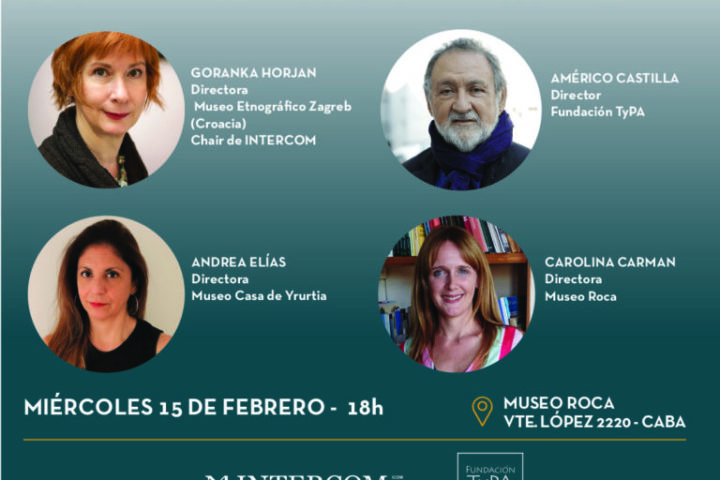February 17, 2023
INTERCOM PARTICIPATED IN THE ROUND TABLE IN BUENOS AIRES Highlights

UNCOMFORTABLE EXHIBITS – HOW TO DEAL WITH CONFLICTING
CONTENTS
INTERCOM Chair, Goranka Horjan participated in the round table organized by ICOM Argentina and with participation of Fundacion TyPA with the aim to current challenges related to sensitive heritage issues, decolonization and demonumentalisation. The meeting was hosted by Museo Roca in Buenos Aires and was attended by many museum professionals.
As a guest speaker Horjan focused on how politics may play a significant role in shaping museum concepts and the examples she brought forward were those from the region of South East Europe and Croatia. With many different nations, states, occupations, reshaping borders there were a lot of conflicting history issues for museums. She also showed how time distance from the events has an effect on emotions towards certain period and can influence that same events are seen in a different way. Idealization or animosity can be also connected with personal background and inherited stereotypes. Carolina Carmen, the director of the Roca Museum spoke about the challenges of her museum devoted to the controversial political figure of A. Roca whose former deeds are differently perceived by the public today than it was during his lifetime. Sensitive issues of borders and territories are nowadays being questioned by many indigenous communities.
The initiator of the round table was Andrea Elias, the director of the Casa de Yrurtia Museum and INTERCOM member. She spoke about the history of collection in her museum and how it was related to the management of the institution. The museum was formed from the heritage of those who inhabited the house. Sensitive issues of origin assets collected and how the headquarters were run by the first female museum director, Lía Correa Morales, were also brought forward for discussion.
Americo Castilla, the director of Fundacion TyPA with whom INTERCOM collaborates closely on the Leadership Alert project, spoke about the Black Lives Matter movement and their initiatives to remove the statutes of slave trade merchants and those who profited from such unhuman activities. He pointed out a very interesting case of Sir Thomas Picton and how his presentation in public spaces was dealt with. In particular he referred to the National Museum of Wales who included experts of African origin in the process. The result was the Reframing Picton solution which did not remove the evidence of his existence but rather gave a proper explanation of his role, as a slave trader and a war hero who lost his life in the battle of Waterloo. During the discussion, participants mentioned the complexity of the past events with which museums must deal in interpretation and how sensitive some issues may be. Horjan emphasized that slavery in the past was not connected with the color of the skin but with conquests and those submitted to the power of the rule. The benefits of slave trade were not only personal, they gave whole countries the position of power and dominance still visible today. Injustice has no color and we witnessed how during history selected communities could become targets of terror or even genocide like the horrors inflicted on Jewish people during the Nazi rule. During the communist dictatorship in Russia millions of people were sent to gulags although they belonged to the same nation as oppressors.
Museums must take into account all facts when interpreting the past and have a vital role in sending a strong message that human rights should be respected and repression of any kind towards other human beings is unacceptable.

